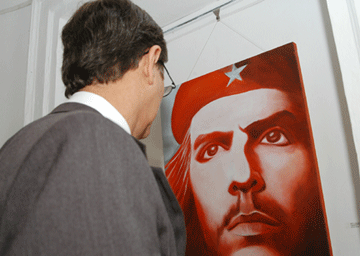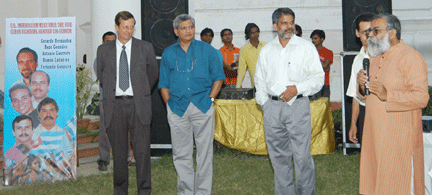 People's Democracy
People's Democracy
(Weekly
Organ of the Communist Party of India (Marxist)
No. 42
October 21, 2007
(Weekly
Organ of the Communist Party of India (Marxist)
|
Vol.
XXXI
No. 42 October 21, 2007 |
Artists Remind US Of Che’s Message

Suneet Chopra
FOR those of us who were in their early twenties in October 1967, Che Guevara’s murder by the CIA in Bolivia was like an electric current passing through our bodies. Not that the invasions of US imperialism were new to us. The war in Vietnam was at its height. Cambodia had been invaded. Massive protests rocked Europe and Britain, where I was a student at the time. And the wanton destruction by imperialist forces, which had earlier bombed Hiroshima and Nagasaki, killing hundreds of thousands of innocent civilians in Japan only to test the most horrible weapon of mass destruction invented by man, the Atomic Bomb, has continued relentlessly since then.
Today imperialism has invented far worse weapons that they have tested on the civilian populations Iraq, Afghanistan and Lebanon. In the name of regime change, the elected president of the Chilean people, Salvador Allende, was murdered in an army coup that proceeded to murder thousands after that, including the Nobel Prize winning poet, Pablo Neruda. In 1991 the USSR was dismantled, and dismembered, Grenada was invaded, Nicaragua was destabilised and Yugoslavia with its proud anti-fascist record and one of the founders of the non-aligned movement was torn to bits as was Czechoslovakia, and states that Hitler had created have once more emerged in the Balkans, not as a natural process, but with the armed might of NATO behind them. “Democracy” was being imposed on the barrel of a gun with the help of generals like Pinochet, Sucharto and the like. And it was Che who told us that such a global oppression could only be stopped with a global resistance to it, by creating “twenty Vietnams” all over the world. The Vietnam war ended with the rout of US imperialism, as Che had predicted. The process is still going on today. Bolivia, Chile, Venezuela, Nicaragua and Brazil have all been able to reinforce their sovereignty by throwing out the US imposed regimes in their countries. In South Africa, apartheid has ended and Nelson Mandela could become its president. The Palestinian people today run the administration in territories occupied by Israel, but the fight goes on.

Cuban ambassador, Sitaram Yechury, Vijayraghavan and Suneet Chopra at the inaugural function
What comes home to one is the continuity of the process. If imperialism continues to occupy Iraq, foment trouble in Central Asia, prop up military regimes in Pakistan and Bangladesh, and threaten Iran and Korea, the hatred against US imperialism still drives millions of those suffering from its loot and oppression to confront it, challenge it and eventually to defeat it. And when we do, the memory of Bhagat Singh, Kartar Singh Sarabha, the martyrs of the Ghadar movement, the Telangana, Tripura, Jammu and Kashmir peasant uprisings, of the Chittagong hills battle, of Punnapra-Vaylar, Kayyur and almost every region of our country, of Che Guevara, Salvador Allende, Patrice Lumumba, and those who died defending national sovereignty in Angola, Mozambique, Zimbabwe, Western Sahara, Palestine, Iraq, Lebanon, Iran and so many countries of Asia and Africa, and of those who fought imperialism to establish socialist states in China, Korea, Afghanistan, East Europe and the USSR, will come together like the light of the dawn of the new world generations of revolutionaries have fought for and died, so that others can live in it.
It is to remind ourselves of this promise every revolutionary makes to those who come after us that the 'National Committee for Solidarity with Cuba' planned to observe the fortieth anniversary of the death of Ernesto Che Guevara by organising an exhibition of paintings by sixteen young painters and one sculptor who were either babies or were not even born when Che died. This was not the first time Indian artists have painted Che. The eminent artist Krishen Khanna, painted a series of works on Che that were exhibited by the Pundole Gallery in Mumbai, years back. So this exhibition at the Travanocre Palace Gallery in New Delhi on October 8-9 was very much a part of an ongoing tradition in our art.
Che’s image still carries the revolutionary fervour of the living Che in the young artists of today. Both Atul Sinha and Ankur Rana focused on speed in works that evoke the “Motorcycle Diaries”. He is not remote to Chand Mohammed who sees him as friend with his hand on his shoulder. Ritu A Kamath sees him as a fiery image, both contemporary and familiar. Sunil Kumar too, sees him as an inspiration to the young. Indrajit Narayan sees him as an undying flame that lights the way for the people while Mekhla Harrison and Manoj Nayak have linked his image with the cause of the barefoot masses. Yati Jayaswal has seen him as a resonance with microphones and sound systems while Ruchika Singh has set him on a post-card from India to Cuba, reminding us that today Che belongs to the world.
Anoop Kamath, Mohan Singh, Saba Hasan, Vijayata Bhamri, and Vijendra Sharma (who incidentally, has recently painted the official portrait of president of India) have concentrated on different aspects of the thoughtful and directed nature of Che, while Dharmendra Rathore has painted an abstract linking Fidel with him, showing them as being inseparable and “on the same wavelength”. Devajyoti Ray and Nand Kishore, have dealt with the way in which reality and image interact with each other over time and get sanitised ; but, it is we who hold the key to the process.
The exhibition was opened by the Cuban ambassador, Miguel Angel Ramirez, while the Ambassadors of Vietnam, Venezuela and Paraguay attended show. CPI(M) Polit Bureau member Sitaram Yechury released the catalogue. Among those present at the event were CPI(M) general secretary, Prakash Karat, CPI(M) Polit Bureau member K Varadarajan, CPI(M) central committee members Hari Singh Kang and Noorul Huda, veteran communist and former AIPSO chairman Ramesh Chandra, poet Ashok Vajpeyi, artist Arpana Caur, art critics Vinod Bharadwaj and Nuzhat Kazmi, writer Uma Vasudev film persons Arun Vasudev and M K Raina and a large number of intellectuals, artists, writers and leading gallery owners of the capital.
The guests were welcomed by A Vijayaraghavan (MP) convenor of the 'National Committee for Solidarity with Cuba' who also thanked Suresh Dua, the gallery owner who had sponsored the catalogue for the show, which was not commercial but was gifted to Cuba. That evening we left the exhibition with the feeling that Che’s ideals were still alive in us and forty years had only made them stronger as we had just signed the petition to free the five young Cubans who had risked their lives to bring the CIA-backed Miami gangs to public exposure and prevent terrorism after we had seen a film on the activities of US sponsored terrorism in Cuba.